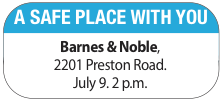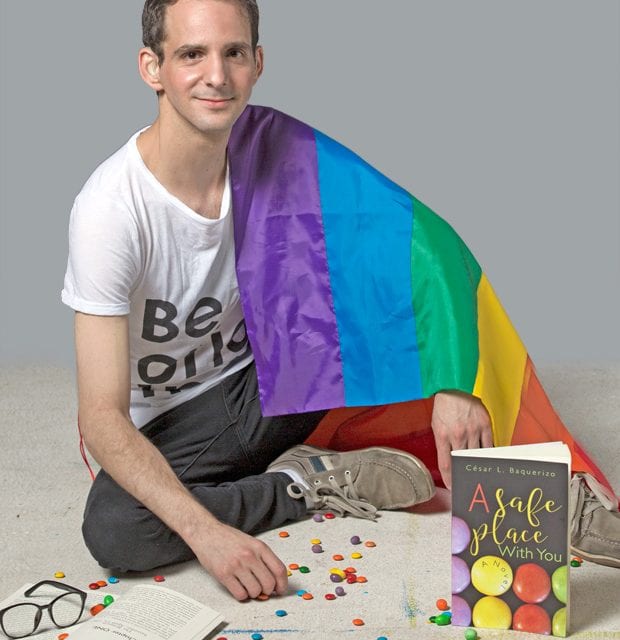Cesar Baquerizo’s mission to expose the horrors of gay conversion therapy

Cesar Luis Baquerizo has a soft spot for underdogs. It’s an attitude borne from experience. Born in Quito, Ecuador, Baquerizo has lived most of his life with a 90 percent hearing loss. And he grew up gay in a culture that still takes a macho attitude about sexuality — so much so, that within the last decade, his native country has undergone several scandals about gay “conversion therapy” centers that go to extremes to “cure” people of their homosexuality.
Baquerizo was so moved by the tales of abuse in these clinics that in 2011 — at age 25 — he began writing A Safe Place with You. A sweeping novel that spans the founding of a (fictional) conversion clinic in the 1970s and goes up to the present day, A Safe Place with You tells a compelling story about a young man who provides light to his fellow “patients” while detailing the hypocrisy and damaging attitudes that have demonized homosexuality.
Against the odds, he spent years trying to find a publisher for the English-language version of the book. “Rejections were always there — it was a tough time and very bad emotionally,” he says. “On my last attempt, I found myself with an acceptance letter. I remember jumping around with so much happiness.”
Earlier this year, Baquerizo finalized the English-language translation, and started his own North American book tour, which brings him to the Barnes & Noble in Plano this Saturday.
“What brought me here is my dream to spread my message about the horrific practice of conversion therapy,” Baquerizo says. “The reality is, only in Vermont, California, New Jersey, Illinois, Oregon and the District of Columbia is conversion therapy on minors banned. That means 45 states don’t protect youth LGBTQ that are rejected by their own family and sent to these horror experiences. Reparative/conversion therapy is a dangerous practice that destroys and distorts psychologically and spiritually LGBTQ youth. A Safe Place with You is about the journey to love yourself and encourage self-acceptance.”

Dallas Voice: You’ve had a journeyman career, but you’ve said writing this book was a dream come true. Did you always want to write this book, or did you just feel you needed to tell a story, and this is the one that came to you? Cesar Baquerizo: Well, writing a book is a dream I wanted since I was 14. I started writing back as a kid in my primary school, but more like a hobby. It was an activity I used to entertain myself so I could explore my creativity.
Writing this book came to me unexpectedly. When I first found out about the illegal clinics that were operating to “cure” homosexuality, it really impacted me. I felt that need to do something — to act up so I could create more awareness about the dangerous and awful practice that is conversion therapy. I got inspired to create a fictional world with fictional characters that are in fact not that different from our current reality. I do need to tell this story so I can make a good difference to reach people’s heart to allow them to be placed in the LGBT [person’s] shoes, so they can understand how does it feel to be right there with my characters.
Speaking of the clinics: How much research did you do? How much of the details are based in fact? When I first started writing the Spanish version in August 2011, it was difficult for me to research directly with the patients, because most of the victims did not give their whereabouts or their names for [personal security reasons]. The victims’ testimonies and the information from the health ministry of Ecuador [accounts] about the illegal clinics published in newspapers helped me and inspired me to write A Safe Place with You. It was after I published [in Spanish] that I got the chance to have conversations with survivors of these very real clinics and their stories ended up similar [to what] I wrote. They later let me know how they identified with my characters.
So there’s nothing autobiographical about it? I’m not necessarily telling my life story, but there are some parts based on my own experiences in coming out, what I felt about the Bible, about the society. Also, each of my characters have something and different sides of me. I can say that I wrote and created all my characters like alter egos.
So, do you personally know anyone who went through conversion efforts? I have a dear friend, who is so brave and inspiring, who told me that in late 2014, his father wanted to put him in a center to “cure” his homosexuality. His father never told him directly, but it was like a conspiracy [in his] family. Luckily, his sister warned him, “Be careful.” He was paranoid everywhere he would go because he knew how hundred of these clinics were discovered by the health of minister [in 2011]. So he decided to leave the country. He now resides in Canada and lives proudly, married with his longtime boyfriend, who is from Ecuador, too. Their story inspired me even more to come forward to talk about these issues.
I [also] met a guy who confessed me that he was forcibly taken by his family to a center where he suffered both physically and emotionally. It was a nightmare for him. Luckily, his parents took him out months later. [But] many families will say nothing to see their sons “healed” from their “bad behavior.”
 What is the state of gay rights or gay acceptance like in Ecuador — or Latin America in general — now? Is it getting better? Well, the problem is that these centers are hidden. I can’t tell how many of these clinics may still exist in Ecuador or around the world. They may even exist in your own proverbial backyard. We have protection laws against LGBT discrimination [in Ecuador], but still we have a lot do in our society to stop violating our rights. It’s important to speak out [and be] more visible about these issues that destroy LGBT youths’ lives. The reality is that most LGBT people here are influenced by the views of the society and are obligated to still live in the closet. They even have to create a double life to make their families proud, to receive the inheritance and to “protect” their family’s name. The rest of us who aren’t closeted do our best to show our diversity and to inspire the closeted ones that there is nothing wrong in them and there will be always someone who will accept and understand their true identity.
What is the state of gay rights or gay acceptance like in Ecuador — or Latin America in general — now? Is it getting better? Well, the problem is that these centers are hidden. I can’t tell how many of these clinics may still exist in Ecuador or around the world. They may even exist in your own proverbial backyard. We have protection laws against LGBT discrimination [in Ecuador], but still we have a lot do in our society to stop violating our rights. It’s important to speak out [and be] more visible about these issues that destroy LGBT youths’ lives. The reality is that most LGBT people here are influenced by the views of the society and are obligated to still live in the closet. They even have to create a double life to make their families proud, to receive the inheritance and to “protect” their family’s name. The rest of us who aren’t closeted do our best to show our diversity and to inspire the closeted ones that there is nothing wrong in them and there will be always someone who will accept and understand their true identity.
I don’t try to generalize about my country or to judge someone, but what I’m sharing are facts that need to be known in order to stop spreading the misconception about what is sexuality — which is diverse. We are all here with our different sexual orientations and we shouldn’t be ignored. The reality is that most LGBT people are influenced by their views of society and religion, which don’t let them experience the journey of humanity where they get to find, discover and know who they are.
You’ve been 90 percent deaf most of your life. Has that informed your novel? Or your identity as a gay man? Do you have an “outsider” quality based on both of these? I identify myself with all my particularities. Being gay is not the only thing that makes me. I’m more than that. Each part of me shows the rest how the same we are, because we are all different. I’m deaf, too. I did experience being an outsider in my teenagers years for being gay and deaf. At that time, I felt [like I wasn’t] part of the deaf community for not knowing ASL signs and [I wasn’t] part of the gay community for not seeing anyone being openly proud. I struggled a lot to fit in this society because I couldn’t relate or identify myself with anyone. But I managed to find myself proudly as part of both communities when I realized there were more people like me. I believe that we can make a big change all together by [making] our diversity more visible so everyone can see us, especially the kids, who are the ones that are going through the hard times alone. I’m learning ASL signs little by little and I enjoy new experiences.
There’s a strong romantic component to your book. Is that just your Latin roots coming through? Oh, I always have been romantic, a dreamer and an adventurer. I like to have new experiences. I like to work hard because it makes me feel alive. I’m romantic because I like to think that loving someone with a lot of affection and to want to make that person your everything — it’s a beautiful feeling in life.
This article appeared in the Dallas Voice print edition July 8, 2016.











